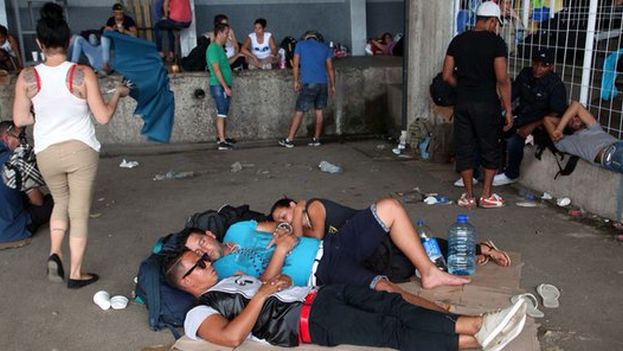
![]() EFE/14ymedio, Managua, 16 November 2015 — Tension is growing between Costa Rica and Nicaragua because of a group of 1,600 Cubans trying to cross the border with safe conduct passes issued by the Costa Rican authorities, who are being blocked by the Nicaraguan army.
EFE/14ymedio, Managua, 16 November 2015 — Tension is growing between Costa Rica and Nicaragua because of a group of 1,600 Cubans trying to cross the border with safe conduct passes issued by the Costa Rican authorities, who are being blocked by the Nicaraguan army.
On Sunday, Costa Rica’s Foreign Minister Manuel Gonzalez rejected Nicaragua’s accusations with regards to the granting of temporary visas to Cubans and strongly criticized the use of force to prevent them from crossing the border.
“I absolutely refute each one of the words included in the statement of the Nicaraguan authorities,” Gonzalez said at a news conference, referring to the Nicaraguan Government’s official bulletin in which in branded Costa Rica as irresponsible and provoking a humanitarian crisis.
“Sending the country’s Army against a migrant population in the situation in which men, women and children find themselves. That’s the way this country (Nicaragua) addresses this issue”
“Sending the country’s Army against a migrant population in the situation in which men, women and children find themselves. That’s the way this country (Nicaragua) addresses this issue,” the foreign minister deplored.
The diplomat denied that Costa Rica has “launched” the Cuban immigrants on Nicaragua saying that Nicaragua closed the border last Friday, which prompted the Cubans to try to cross illegally.
According to Gonzalez, the Nicaraguan Army repelled the immigrants with gas and violence, and he lamented that that country does not see the situation as a humanitarian issue.
“What Costa Rica has done is to regularize the situation of immigrants through a seven day transit visa. But when other countries take the irresponsible decision to close their borders, these people will search for any mechanism to reach their destination” said the minister.
The foreign minister said his country respected international treaties and the human rights of immigrants, and that this can be confirmed by the United Nations High Commissioner for Refugees (UNHCR) and the International Organization for Migration (IOM) with whom they worked on this situation.
At the same time, the Nicaraguan Army announced the reinforcement, by an infantry battalion, of the southern border. The military institution said in a statement Sunday that the Costa Rican authorities “launched” Cuban citizens on the legal crossing of Peñas Blancas, “who pushed for the forced and illegal entry into the country, violating our laws.”
As a result, the Army said that the Caribbeans are being held and captured by its border detachments to return them to Costa Rica.
The Nicaraguan Army reinforced control of the southern border and accuses Costa Rica of “launching” at it Cuban citizens, “who pushed for the forced and illegal entry into our country, violating our laws”
“In compliance with the mandate of the Constitution and laws of Nicaragua to ensure the defense of our borders, the inviolability of the national territory and to enforce our laws, the Army of Nicaragua will not allow the entry of illegal persons into the country, to which end it has reinforced the southern border with an infantry battalion,” he added.
In recent weeks a wave of some 1,600 Cuban immigrants gathered on the border between Costa Rica and Panama, which the Costa Rican government decided to resolve by giving them seven day transit visas through that country.
The Cubans initially arrived in Ecuador by air, then passed illegally by sea and land through Colombia and Panama to reach Costa Rica. Their intention is to cross all of Central America.
Foreign Minister Gonzalez called on all countries involved in the transit of Cuban immigrants to create a “humanitarian corridor” to give them protection and to ensure respect for their human rights so that they would not fall into the human trafficking networks.
“Far from missing our responsibility, knowing that Costa Rica is not the point of origin of this situation nor its point of destination, we advocate the creation of a humanitarian corridor. This is a structural problem that must be tackled internationally for all countries involved,” he said.
